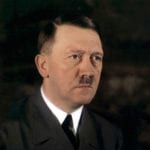 Animals
Animals  Animals
Animals  Weird Stuff
Weird Stuff 10 Strange and Unexpected Things Smuggled into Strict Authoritarian Countries
 Our World
Our World 10 Terrible Crimes That Are Destroying the Amazon
 Miscellaneous
Miscellaneous 10 Timely Stories about Clocks
 History
History 10 Magnificent Heroines Who Went Undercover to Defeat the Nazis
 Music
Music 10 Surprising Stories Behind Famous Songs
 Weird Stuff
Weird Stuff 10 Crazy Things Your Body and Brain Do (Explained)
 The Arts
The Arts 10 Historic Instruments Worth More Than a Luxury Car
 Technology
Technology 10 Crazy AI Controversies… So Far
 Movies and TV
Movies and TV 10 Fictional Plagues We’re Glad Aren’t Real
 Animals
Animals Ten Astonishing Stories about Underwater Life
 Weird Stuff
Weird Stuff 10 Strange and Unexpected Things Smuggled into Strict Authoritarian Countries
 Our World
Our World 10 Terrible Crimes That Are Destroying the Amazon
Who's Behind Listverse?

Jamie Frater
Head Editor
Jamie founded Listverse due to an insatiable desire to share fascinating, obscure, and bizarre facts. He has been a guest speaker on numerous national radio and television stations and is a five time published author.
More About Us Miscellaneous
Miscellaneous 10 Timely Stories about Clocks
 History
History 10 Magnificent Heroines Who Went Undercover to Defeat the Nazis
 Music
Music 10 Surprising Stories Behind Famous Songs
 Weird Stuff
Weird Stuff 10 Crazy Things Your Body and Brain Do (Explained)
 The Arts
The Arts 10 Historic Instruments Worth More Than a Luxury Car
 Technology
Technology 10 Crazy AI Controversies… So Far
 Movies and TV
Movies and TV 10 Fictional Plagues We’re Glad Aren’t Real
10 Bizarre Coincidences That Altered the Course of History
In the grand tapestry of history, woven with countless stories of empires, heroes, and revolutions, it’s the tiny stitches that often make the most difference. These seemingly insignificant moments, dictated by sheer chance or a whimsical twist of fate, have rerouted the course of entire civilizations.
Imagine a world where Napoleon met his end prematurely or where WWII took an entirely different trajectory. These aren’t mere “what ifs”—they were moments teetering on the edge of reality. Dive in and discover ten historical near-misses that could have reshaped the world.
Related: 10 Places That Still Bear the Evidence of History
10 Blast from the Past
In the annals of history, it’s sometimes the seemingly small moments that wield the most significant impact. Take Napoleon Bonaparte. Known for his audacious conquests and a particular liking for chic hats, he also had a knack for unexpected punctuality, which, as luck would have it, saved his skin one day.
On that day, a group of crafty royalists hatched the “Plot of the Rue Saint-Nicaise,” planning to present Napoleon with an explosive surprise. But thanks to a fortuitous change in his schedule (perhaps a last-minute decision to perfect that iconic hat or a dalliance with a pastry), Napoleon narrowly avoided the explosion. History, it seems, isn’t just shaped by battles and grand speeches but by whims, wardrobe choices, and the occasional croissant craving.
This near-miss not only changed Napoleon’s day but could’ve drastically rewritten European history. Because, let’s face it, a Europe without Napoleon’s influence? That’s a story for an alternate universe![1]
9 When Snail Mail Led to War
We’ve all groaned about slow mail delivery, but rarely has a delay held such colossal historical weight as the one on December 7, 1941. While postmen of yesteryears might’ve been thwarted by bad weather or a mischievous dog, the crucial warning about the imminent Japanese attack on Pearl Harbor was, regrettably, held up by a cocktail of complications.
Imagine the anticipation akin to waiting for an important letter (or, these days, perhaps an Amazon delivery). Only, instead of a missed birthday card, this was the news of a massive military assault. By the time the message was finally handed over, bombs were already dropping, battleships were in chaos, and WWII had an undeniable new participant: the United States.
Hindsight’s a curious thing. One can’t help but muse about the intricate dance of cause and effect. Because, in an era without WhatsApp or speedy emails, a seemingly simple delay changed the course of a global conflict.[2]
8 The Oopsie That Fueled the Fight for Freedom
You know that sinking feeling when you realize you’ve misplaced something important? Now, multiply that dread a few thousand-fold, and you might get close to how someone in the Confederate Army felt upon misplacing the “Lost Order.” This wasn’t just a mislaid grocery list or a forgotten birthday card; it was a detailed plan of their maneuvers.
Stumbled upon by the Union Army, it was like unexpectedly finding an enemy’s playbook just before the big game. Seizing this serendipity, the Unionists claimed victory at the Battle of Antietam. This wasn’t just any triumph, though. It bolstered President Lincoln’s resolve, leading him to issue the Emancipation Proclamation, a turning point in America’s struggle for equality.
In the grand tapestry of history, it’s almost amusing how a single piece of lost paper can echo so profoundly. Maybe next time you misplace your car keys, remind yourself: at least it didn’t change the course of a war![3]
7 The Sole Survivor’s Second Chance: Hugh Williams’s Curious Destiny
Hugh Williams might just be a name you’ve never heard, but history has a peculiar way of etching some into its annals for reasons beyond ordinary comprehension. The River Severn in England witnessed a tragic shipwreck in 1664. Every passenger perished, save for one: a man named Hugh Williams.
Now, fast forward to 1767. Another ship met its doom in the same river. The roster of survivors? Just one. His name? Hugh Williams. If you’re starting to notice a pattern, hold onto your historian hats! In 1820, yet another ship faced its watery demise in the very same river. Among the wreckage, one man was pulled to safety. You guessed it—Hugh Williams. Although some claim these wrecks all occurred on the same date—December 5—the historical facts don’t support that coincidence.
While this might sound like a concoction of a fervent writer’s imagination, it’s a bona fide snippet from history. One might wonder if the River Severn had a peculiar favoritism for the name Hugh Williams or if destiny, sometimes, has a quirky sense of humor. Regardless, next time you find yourself on a boat sailing down the River Severn, maybe check if there’s a Hugh Williams on board![4]
6 The Twice-Blessed Tsutomu Yamaguchi: A Tale of Dual Survival
In a chapter of history where darkness loomed large, Tsutomu Yamaguchi’s tale emerged as one marked by both profound tragedy and incredible fortune. On that fateful morning in Hiroshima in 1945, the skies lit up with a blinding flash, heralding an age of nuclear warfare. Yamaguchi, despite being within the blast radius, miraculously survived.
Perhaps thinking he’d left disaster behind, he traveled to Nagasaki for work. But destiny, with its perplexing sense of timing, had other plans. Just three days after Hiroshima, another atomic behemoth descended upon Nagasaki. And yet, against all conceivable odds, Yamaguchi stood tall after this second devastation, too.
Living to the ripe age of 93, he didn’t just become a testament to human resilience but also a fervent voice for nuclear disarmament. Whenever one speaks of second chances, Yamaguchi’s tale echoes loudly, reminding us that sometimes life’s script is more fantastical than fiction. One wonders: was it sheer luck, destiny’s design, or perhaps a mix of both?[5]
5 The Sandwich That Started a War: Gavrilo Princip’s Fateful Lunch Break
It’s often said that big events hinge on the smallest of details. Enter Archduke Franz Ferdinand’s would-be assassin, Gavrilo Princip. The young Bosnian Serb’s first attempt to take out the Archduke was, well, a bit of a dud. Rather than fleeing the city or brooding in a dark corner, Princip did what many of us might do after a rough day: he headed to a cafe. Perhaps to bite into a sandwich and mull over his botched plan.
Fate, however, has its own way of seasoning events. As Princip chewed on his sandwich, the Archduke’s car, thanks to a serendipitous wrong turn and a stalled engine, ended up parked right outside the very same cafe. Talk about a second serving of opportunity! Seizing this incredible chance, Princip fired, changing the course of history.
It’s bewildering to think how the mundane act of eating a sandwich coincided with the catalyst of World War I. It’s a tale that blurs the line between farcical happenstance and grim reality.[6]
4 When Timing Trumped Tyranny: Hitler’s Clock-Watching Escape
It’s said that punctuality can save one from a multitude of sins, but who would’ve imagined it might spare the world’s most infamous dictator? In 1939, the world was on the edge, looking into the abyss of World War II. As countries braced for conflict, a few brave souls schemed to extinguish the fiery heart of the Nazi regime.
Enter the scene: a carefully planned explosive set to silence Hitler and possibly alter the course of history. The stage was primed, the fuse burning, all poised for a world-changing “boom.” But fate, with its sometimes-questionable sense of humor, saw Hitler leave earlier than scheduled. Perhaps he had a hankering for an early lunch or a sudden disdain for long meetings.
One has to wonder: If Hitler had dallied just a tad longer, maybe to re-tie a wayward shoelace, could the course of World War II have taken a sharp detour? Time, as they say, waits for no man—not even if he’s Adolf Hitler.[7]
3 When the King’s Calendar Caused a Crisis: Louis XVI’s Tragic Tardiness
Ah, the perennial perils of missed appointments! Even in our digital age, calendar blunders can turn a smooth day into a chaotic one. But back in 1791, King Louis XVI of France experienced the ultimate “oops” moment when a simple timing mix-up became a matter of life and death.
Amid the fiery turmoil of the French Revolution, the embattled Louis XVI sought refuge. Plans were discreetly set for the king to rendezvous with a trusted general to discuss his escape. Alas, a mere miscommunication on timing prevented this pivotal parley. Maybe he misread the sundial? Or perhaps the court jester gave him the wrong hour?
The fallout from this missed meet-up was grim. King Louis, failing in his escape attempt, was ultimately captured and faced the cold embrace of the guillotine. One can’t help but muse: had smartphones existed back then, would a timely reminder have saved a king’s neck?[8]
2 When FDR’s Backseat Decision Dodged Destiny: A President’s Near-Miss
We’ve all made last-minute decisions that seemed inconsequential at the time. You know, choosing a latte over a cappuccino or deciding to wear the blue tie instead of the red. But for President-elect Franklin D. Roosevelt in 1933, an impromptu change of location was not just a simple choice; it was a twist of fate.
As the eager crowd awaited FDR’s speech, an anarchist saw an opportunity to rewrite history. His murderous intent focused on the podium. Yet, in a spur-of-the-moment decision, Roosevelt opted to deliver his address from the cozy confines of his car’s backseat. It wasn’t about comfort; it was a fateful choice that obscured him just enough to prevent becoming a bullseye for the gunman’s rage.
It’s intriguing to consider how this single act of improvisation not only shielded a president but also preserved the course of a nation. In the grand tapestry of history, Roosevelt’s car speech was a stitch in time that saved… well, him.[9]
1 When Mother Nature Intervened: The Divine Wind Saves Japan
Ah, the 13th century! A time when Genghis Khan’s descendants, notably Kublai Khan, cast longing eyes on the scenic archipelago of Japan. Brimming with confidence, they launched not one but two invasions. Most would expect this saga to play out with the Mongols swiftly expanding their vast empire. But as fate would have it, the Japanese got a timely gust… or two.
In both 1274 and 1281, as the eager Mongols sailed to Japan with dreams of conquest, they were greeted by something quite unexpected—typhoons, or as the Japanese poetically deemed them, “kamikaze” (divine wind). These storms weren’t on the Mongol’s side, wrecking their fleets and, quite frankly, their imperialistic dreams.
So, while Kublai Khan may have had the might of an empire, it seems he didn’t check the weather forecast. Sometimes, history’s pivotal moments aren’t crafted by grand strategies but by the occasional drizzle or, in this case, a very timely gust. Cheers to Mother Nature’s sense of humor![10]








